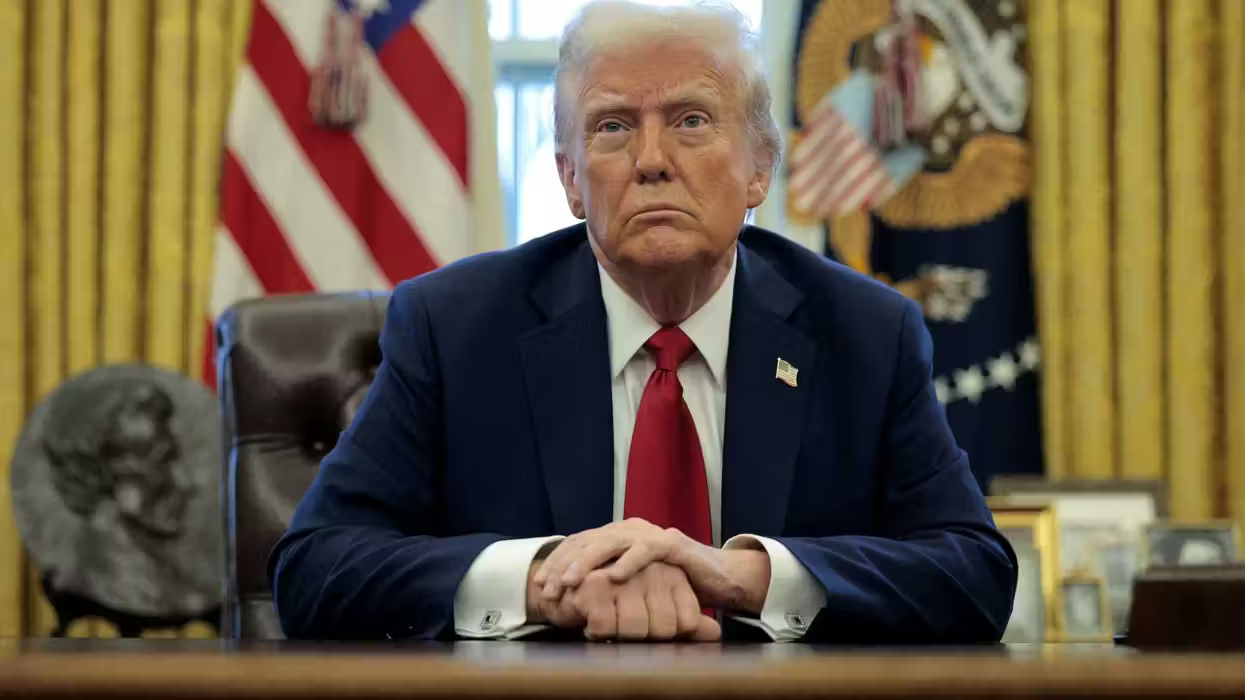 Getty Images.
Getty Images.
The Republican-controlled House on Thursday voted 221-207 to pass Wisconsin Congressman Paul Ryan’s 2014 budget plan.
Rep. Ryan’s budget calls for a repeal of The Patient Protection and Affordable Care Act (i.e. “Obamacare”), cutting taxes, and reduction in the rate of government spending. According to Ryan’s “The Path To Prosperity: A Responsible Balanced Budget,” this will balance the budget in about 10 years.
“Ryan said Thursday morning that Congress needs to get on the glide path to balance to avoid a serious debt crisis, and blamed President Obama for failing to provide leadership on this issue,” The Hill notes.
"He gets his NCAA bracket in on time, but still no budget," Rep. Ryan said Thursday, taking a dig at the president's apparent priorities.
"This is the fourth time in five years," Ryan said, referring to the White House’s tardiness in submitting its budgets. "He set a new record this year, two months with no plan while we have trillion dollar deficits and a debt crisis on the horizon.”
"They have time for the attacks, but no time to offer serious solutions," he added.
And although the Ryan plan passed the House with overwhelming support from Republicans, there were 10 who felt that they couldn’t give it an “Aye” vote.
These are the 10 Republicans who voted “Nay”:
10. Rep. Justin Amash (Mich.)
 Courtesy Rep. Amash
Courtesy Rep. Amash
9. Rep. Paul Broun (Ga.)
 Getty Images.
Getty Images.
“The latest budget proposal by Representative Paul D. Ryan, called 'The Path to Prosperity,' is anything but. It fails to seriously address runaway government spending,” Rep. Broun said in a New York Times op-ed. “I cannot vote for something that would trick the American people into thinking that Congress is fixing Washington’s spending problem, when in actuality we’d just be allowing it to continue without end.”
“Just reducing growth in spending does almost nothing. We have to dig deeper and make profound cuts now. We cannot continue to assume that future Congresses will do our dirty work for us," he adds.
8. Rep. Rick Crawford (Ark.)
 Associated Press.
Associated Press.
“I applaud Representative Ryan’s budget resolution that aims to balance the budget, but I cannot support non-binding resolutions that will be changed with each new Congress. I voted against the Republican non-binding budget resolution to bring attention to Congress’s continued reliance on policies that have clearly failed and to call on my colleagues to focus instead on passing permanent spending controls," Rep. Crawford said.
"During each of the past three decades, Congress has made numerous attempts to control spending with non-binding budget resolutions and deficit control acts yet debt has skyrocketed.
"It is time for Congress to get serious about the debt crisis and economic growth and pass permanent spending controls that will put America on a genuine path to prosperity," he adds.
7. Rep. Randy Forbes (R-Va.)
 Associated Press.
Associated Press.
6. Rep. Chris Gibson (N.Y.)
 Photo courtesy of Gibson.
Photo courtesy of Gibson.
5. Rep. Phil Gingrey (Ga.)
 Georgia National Guard/Flickr.
Georgia National Guard/Flickr.
4. Rep. Joe Heck (Nev.)
 Associated Press.
Associated Press.
"There is a dire need for us to reduce spending, address the major drivers of our debt, and grow the economy by balancing the budget. I have voted to reduce spending, I have voted to repeal and replace Obamacare, and I have co-sponsored and voted for a Balanced Budget Amendment," Rep. Heck said in a statement released after the vote.
"But the policy proposals contained in this non-binding resolution indicate the priorities of this budget, and when those proposals disproportionately affect [my] state, my vote indicates my priority and that priority is Nevada," he added.
3. Rep. Walter Jones (N.C.)
 Associated Press.
Associated Press.
2. Rep. Tom Massie (Ky.)
 Thomas Massie.
Thomas Massie.
“The federal government’s spending is out of control, and this plan actually increases spending,” Rep. Massie said after the vote. “Paul Ryan's proposed House budget would increase government spending at nearly twice the rate of inflation. Our country is deep in debt, and it is irresponsible to increase spending at this rate.”
“Congress has the power of the purse but refuses to spend responsibly. In the past three weeks, House members voted to continue funding Obamacare, and voted for three separate spending bills that will increase our national debt.
“If Congressmen would just vote according to their campaign promises, we could fix the spending problem before it's too late," he adds.
1. Rep. David McKinley (W.Va.)
 Associated Press.
Associated Press.
“The House Republican budget is a serious plan that recognizes the danger of the federal government’s unsustainable spending,” Congressman McKinley said in a statement.
He adds that although Rep. Ryan's "plan is better than other options put forward," it fails to address "issues of vital importance," including coal ash legislation and reform to foreign aid.
“Once each side passes its respective budget, House and Senate representatives should come together at the negotiating table in a bipartisan fashion,” he concludes.
“At that time I hope Republicans and Democrats agree on a compromise that addresses the unsustainable spending by the federal government and provides fiscal certainty for our families and businesses. Once a bipartisan compromise is achieved I will evaluate it for my support,” he adds.
--
Not a single Democrat voted for the bill in the end. However, there was one Democrat who voted in favor initially, but it was only temporary as it appears it was by accident. They quickly changed their vote to a “Nay.
“It’s entirely likely that a Democrat accidentally voted in favor, then realized his or her error and switched it,” the Washington Post reports.
“That’s not uncommon. What with all the votes members have to keep straight, and clumsiness when using that vote-card machine (swipe of a card, then hit a red button for no, green for yes, and yellow for present) mistakes can happen. Or, perhaps, the ‘yes’ vote had a very rapid change of heart,” the report adds.
As of this writing, it’s unclear which Democrat made the “Aye” mistake.
We have contacted each of the 10 congressmen for comment on their “Nay” vote. Half have responded so far and we'll update this article if the other half ever get back to us.
--
RELATED:
Follow Becket Adams (@BecketAdams) on Twitter
Featured image Getty Images. This post has been updated.

 Getty Images.
Getty Images.





